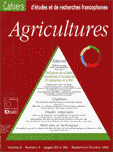Un système paysan de classement des sols dans la zone agroécologique du Djitoumou, Mali
Résumé
The results of research in agricultural sciences are not widely used by farmers in Africa. In the soil sciences, for example, soil surveys or mapping and fertilisation experiments have resulted in many recommendations being proposed. However, since farmers are unaware of them, they remain unused. In the past, a common explanation for their not being used was the « farmers' refusal » to accept modern innovations. Today, however, new ideas are coming to the fore and many specialists think that research of the past was not properly geared towards agricultural development. One new concept involves the use of local knowledge [3-8]. Traditional peasant knowledge must therefore be critically examined. Valuable local knowledge for soil classification and management systems does exist in Africa. It can be used in soil mapping, and could improve communication between soil scientists, extension agents and farmers [3-5, 8, 9]. Conducted in conjunction with the farmers themselves, our research in the agroecological zone of Djitoumou (Mali), covering 2,850 km2, looked at their own local soil classification system. The methods used included interviews with farmers, soil profile and environment descriptions, mechanical analysis, and determination of carbon, nitrogen and pH levels. Local soil classification criteria were relief, water regime, top soil texture, colour and vegetation. It was thus found that the farmers distinguish five main types of soil: fuga gilin (lithosol), bèlè dugukolo (poorly differentiated soil on duricrust), cincin duguko-lo (tropical leached ferrimorphic soil), bira dugukolo (hydromorphic pseudo-gley soil), fala dugukolo (hydromorphic gley soil). Types 2 and 5 are both subdivided into two categories. The soils' morphological and analytical characteristics are given in tables 1 and 2. The Djitoumou farmers' soil classification System is very relevant for local management needs. Soil scientists should take it into account when devising means and techniques (soil maps, guidelines for land use, conservation, etc.) for extension workers and farmers. Farmers can also make useful contributions to research programmes devoted to the dynamics of cultivated soil. This would allow research to be better oriented, and also save time and money.Téléchargements
Publié
1995-09-01
Comment citer
Diallo, D., & Keita, D. (1995). Un système paysan de classement des sols dans la zone agroécologique du Djitoumou, Mali. Cahiers Agricultures, 4(5), 371–375 (1). Consulté à l’adresse https://revues.cirad.fr/index.php/cahiers-agricultures/article/view/29911
Numéro
Rubrique
Articles

